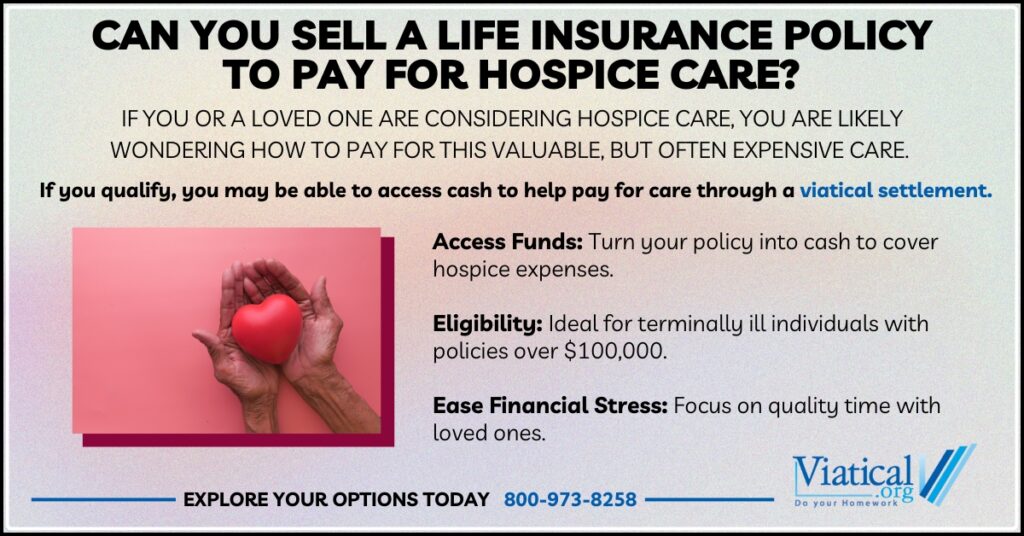If you or a loved one are considering hospice care, you are likely wondering how to pay for this valuable, but often expensive care. Can you sell a life insurance policy to pay for hospice care? The answer is yes you may be able to sell a policy for cash and this option can provide much-needed financial relief during a challenging time. Selling a life insurance policy, often through a viatical settlement, allows policyholders to access a portion of their policy’s value while they are still alive, helping to cover medical bills, living expenses, and end-of-life care.

How Does Selling a Life Insurance Policy Work?
When you sell your life insurance policy, a third-party buyer purchases the policy, offering a lump sum cash payment in exchange. The buyer then becomes the beneficiary and assumes responsibility for future premium payments. For individuals in hospice care, a viatical settlement—designed specifically for those with a terminal illness—may offer the highest payout since buyers are willing to pay more for policies expected to mature in a shorter time frame.
Why Consider Selling Your Policy for Hospice Care?
Hospice care focuses on comfort and quality of life, but it can be expensive. Costs may include in-home care, medical supplies, pain management medications, and support services for family members. Insurance and government programs might not cover all these expenses, leaving families to cover gaps out of pocket. Selling your life insurance policy can provide immediate cash to alleviate this financial burden, allowing you to focus on what matters most—time with loved ones.
Eligibility Requirements for Selling Your Policy
To sell a life insurance policy, you typically need to meet certain criteria:
- Policy Type: Most permanent policies, such as whole life or universal life, are eligible. Usually, a term policy must be convertible in order to qualify for a life settlement, but even non-convertible term policies can qualify for a viatical settlement, especially if the insured is in need of hospice care.
- Face Value: Policies with a death benefit of $100,000 or more are usually preferred by buyers, but some smaller policies may still qualify.
- Health Condition: Viatical settlements require a terminal illness with a life expectancy of two years or less. If your condition is not as severe, you may still be able to qualify for life settlements.
How Much Can You Expect to Receive?
The amount you receive depends on several factors, including:
- Policy Size: Larger policies generally yield higher payouts.
- Premium Costs: Lower premiums are more attractive to buyers.
- Life Expectancy: Shorter life expectancies typically result in higher offers.
Payouts can range from 20% to 70% of the policy’s death benefit. A policy appraisal can help you get an idea of range of value.
Important Considerations
Before selling your policy, weigh the following factors:
- Tax Implications: While viatical settlements are typically tax-free for terminally ill individuals, consult with a tax professional regarding your specific situation.
- Beneficiaries: Selling the policy eliminates the death benefit for your beneficiaries.
- Alternatives: Other options, such as borrowing against your policy or accessing accelerated death benefits if you qualify may also provide financial assistance.
Selling a life insurance policy to pay for hospice care is a compassionate choice that prioritizes quality of life during your final months. By converting your policy into cash, you can ease the financial stress on yourself and your family, ensuring access to the care and support you need. If you’re considering this option, please give us a call at 800-973-8258 for a no obligation policy appraisal.
